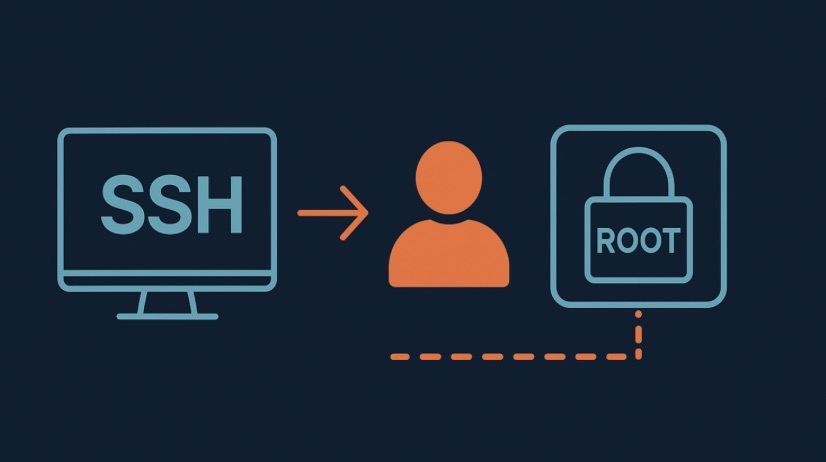SSH-Slip: Critical SSH Agent Vulnerability Grants Root Access on Millions of Linux Systems

A newly uncovered vulnerability known as SSH-Slip is exposing Linux environments to an attack vector that is as dangerous as it is simple. It doesn’t rely on a buffer overflow, kernel bug, or advanced malware—but instead on a misused convenience: SSH agent forwarding.
This logic flaw enables local or remote users to hijack an active SSH agent socket, escalate privileges, and—under specific conditions—gain root access in under a minute.
What makes SSH-Slip particularly alarming is that this mechanism is not exotic. It's present in virtually every development and deployment environment where SSH is used. The vulnerability is silent, easy to reproduce, and very hard to detect post-exploitation.
Security analysts from GitHub and CERT-Bund confirm the public proof-of-concept works on default installations of Ubuntu, Debian, Fedora, and many CI/CD systems. G.Business reports based on their findings.
Why SSH-Slip is so dangerous
Most administrators and developers treat SSH agent forwarding as a harmless productivity shortcut. In practice, it turns any trusted developer's laptop into a silent key ring, accessible from potentially untrusted remote hosts.
Once the agent is active and forwarded, its access is reusable and inheritable by other processes—even across users, if sockets are mishandled. This undermines the entire trust chain of key-based SSH authentication.
5 Immediate Security Hacks to Prevent SSH-Slip
These are actionable, field-tested techniques every DevOps, SRE, and system admin should apply right now:
- Globally disable
ForwardAgentin both local and system-wide SSH configs
bashKopierenBearbeitenecho "ForwardAgent no" >> ~/.ssh/config
chmod 600 ~/.ssh/config
sudo sed -i 's/^#\?AllowAgentForwarding.*/AllowAgentForwarding no/' /etc/ssh/sshd_config
sudo systemctl restart sshd
- Use
ssh-add -cto require confirmation before the agent signs anything
This prompts for confirmation each time a key is used.
bashKopierenBearbeitenssh-add -c ~/.ssh/id_ed25519
- Replace long-living SSH agents with keychain-based ephemeral sessions
Use keychain or gpg-agent to manage sessions with expiration timers.
bashKopierenBearbeitensudo apt install keychain
echo 'eval $(keychain --eval --quiet id_rsa)' >> ~/.bash_profile
- Audit your CI/CD runners – never use agent forwarding in deployment pipelines
Instead, use encrypted secrets managers, GitHub/GitLab deploy tokens, or cloud-native tools like gcloud, sftp, or Vault.
- Purge vulnerable shell hooks from
.bashrc,.bash_profile, and crontabs
These are favorite injection points for attackers. Run:
bashKopierenBearbeitengrep -E 'ssh|agent' /home/*/.bashrc
crontab -l -u ci-user
What is SSH-Slip and how does it work
SSH-Slip is not a traditional exploit—it’s a misuse of legitimate functionality combined with poor socket hygiene and insecure system defaults.
Here's how it works in real-world conditions:
- A user logs into a server using
ssh -A, enabling agent forwarding. - A socket like
/tmp/ssh-XYZ/agent.12345is created, allowing remote use of local private keys. - This socket is accessible by other local users due to incorrect permissions, inherited sessions, or misconfigured environments.
- An attacker executes a script that interacts with the agent, using forwarded keys to authenticate or inject commands on other systems.
In some cases, .bashrc or .profile can be modified to maintain persistence and reuse agent credentials.
Affected Systems and Configurations
SSH-Slip is environment-based, not software-specific. Any system with the following traits is at risk:
| Environment | Risk Level | Notes |
|---|---|---|
| Ubuntu 20.04–24.04 | High | Agent forwarding enabled by default |
| Debian 10+ | High | Common in dev environments |
| RHEL 8+, Fedora | Medium | Forwarding often used manually |
| GitHub/GitLab CI | Very High | Deployments often misuse SSH |
| Docker hosts with SSH | High | Poor socket cleanup common |
Step-by-Step: How to Protect Your Infrastructure
Disable SSH Agent Forwarding on All Systems
Agent forwarding should be the exception, not the rule. Globally disable it.
On clients:
bashKopierenBearbeitennano ~/.ssh/config
Add:
nginxKopierenBearbeitenForwardAgent no
On servers:
bashKopierenBearbeitennano /etc/ssh/sshd_config
Add or update:
nginxKopierenBearbeitenAllowAgentForwarding no
Then restart:
bashKopierenBearbeitensudo systemctl restart sshd
Clean Up SSH Sockets Automatically
Agents leave behind Unix sockets that can be reused.
Add a cronjob:
bashKopierenBearbeiten*/5 * * * * root find /tmp -name 'ssh-*-agent*' -type s -delete
Also clean up /run/user/*/ssh-* and any other agent-related folders in multi-user systems.
Audit and Harden Your CI/CD Pipelines
If you're forwarding SSH agents to runners, you're already exposed.
Checklist:
- Avoid
ssh -Ain build jobs - Use environment variables with short-lived tokens
- Store keys in a secure vault or encrypted key store
- Remove any
.bashrcorcrontabentries that use SSH
Enable SSH Logging for Forensics
In /etc/ssh/sshd_config:
bashKopierenBearbeitenLogLevel VERBOSE
This logs agent forwarding, key use, and session data.
Recommended: Stream SSH logs into your SIEM or intrusion detection system and set alerts for unusual agent use or key access.
Summary: SSH Convenience Can Lead to Complete Compromise
SSH-Slip is not about code defects. It's about decades-old design decisions that no longer hold up in modern infrastructure. The assumption that forwarded agents are safe is no longer true.
| Task | Recommended Action |
|---|---|
| Check SSH configs | Disable ForwardAgent everywhere |
| Audit CI/CD runners | Remove agent dependencies |
| Clean temp sockets | Use automated cron cleanup |
| Log agent access | Enable VERBOSE logging |
| Educate teams | Spread awareness of SSH risks |
Thoughts: Root Should Never Be This Easy
If any user on your system can become root by exploiting forwarded credentials, your environment is not secure. The barrier to root must be real—technical, logged, and hard to bypass.
SSH-Slip proves that even trusted tools need zero trust.
Patch your assumptions. Then patch your systems.
Stay connected for news that works — timely, factual, and free from opinion. Learn more about this topic and related developments here: chwoot: he sudo flaw that turns local Linux users into root – in seconds

